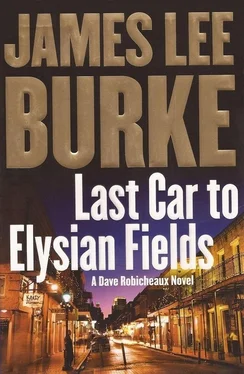It wasn’t hard to find. Five hundred yards from the road, where two tin-roofed farmhouses had once stood amidst cedars and poplar trees, bulldozers had scoured a thirty-acre wound in the earth for the construction of houses that looked as if they had been designed by a man with delirium tremens. At the entrance to the subdivision-in-progress a workman was spreading kerosene on a huge pile of oaks and slash pines that had been recently lopped into segments with chainsaws.
I parked my cruiser in a cul-du-sac flanked by three framed structures that several electricians were wiring. The man I had seen throwing firecrackers in the air by Castille LeJeune’s horse barns was talking with a truncated, moon-faced workman in a yellow hard hat.
When the workman saw me, he turned his face away, mounted the steps of a framed structure, and busied himself with a nest of wiring hanging from the back of a breaker box.
William Guillot wore shined cowboy boots and dark blue western slacks with high pockets and a gray snap-button shirt. He seemed to be one of those men to whom age was an asset and maturity a source of power and confidence. His skin was grainy, his profile rugged; in fact, he had all the handsome characteristics of the archetypical western horseman, except for a purple birthmark that was like dye that had leaked from his hairline into the corner of his left eye.
“Help you?” he said.
“My name’s Dave Robicheaux. I’m a detective with the Iberia Sheriff’s Department. Are you William R. Guillot?” I said, my gaze wandering from him to the electrician in the yellow hard hat.
“Call me Will. What can I do for you?” he said.
“Where were you Monday night, Mr. Guillot?”
“At my fish camp. Down at Pecan Island.”
“Anybody with you?”
“Maybe. What is this?”
“We’re in possession of a revolver that’s registered in your name. It’s a single-action Colt .38. You own a weapon like that, sir?”
His hazel eyes fixed on mine and never blinked. “Say that again.”
I repeated my statement.
“Yes, I do own one. But it’s at my house,” he said.
“Not anymore.”
“Bullshit,” he said, half smiling.
“I think we’d better take a ride to your house and check it out.”
“If you haven’t noticed, I’m building a subdivision.”
“You an architect?”
“No.”
“The revolver registered in your name is part of a homicide investigation, Mr. Guillot. If I were you, I’d get my priorities straight.”
“Homicide?” he said, genuinely surprised.
“You own a brown pickup truck?”
“I don’t. The company does. What about it?”
But I was looking at the back of the electrician who had walked away, and was not listening to William Guillot anymore.
“Did you hear me? What the hell is going on? Why are you staring at my electrician like that?”
“Is he your subcontractor?”
“What about it?”
“He installed defective wiring in the walls of my house. It burned to the ground,” I said.
Guillot’s eyes narrowed and dropped briefly to my person, as though he were filing away my inventory in a private compartment. “Follow me to my house,” he said.
Twenty minutes later I stood in his home office, the sunlight breaking through a pecan tree by the side window, while he searched his desk, a wall safe, and the drawers of a gun cabinet. “It’s gone,” he said.
“You have a break-in recently?”
“Six or seven months ago.”
“You reported it?”
“Yeah, but I didn’t miss the .38. Why would somebody steal only the .38 and none of my other guns?”
“Write down the names of the person or persons you were with Monday night.”
“Maybe I don’t want to do that.”
“I see. Maybe you can work through that problem in a jail cell.”
He wrote a woman’s name and address and telephone number on the top page of a scratch pad and handed it to me. “My wife and I are separated. Her lawyer is trying to clean my clock. This isn’t information that will help my situation,” he said.
“It’s not our intention to compromise your privacy,” I said.
But his eyes grew heated, as though he were remembering an unfinished, angry thought. “Back there at the house site, you made a serious accusation about my electrician. Did you file charges against him?” he said.
“In New Iberia we have no inspection system outside the city limits. Also, in Louisiana an electrical contractor has no liability one year after the work is done. You like building homes in Louisiana, Mr. Guillot?”
“I think you’ve got an ax to grind, Mr. Robicheaux. Let me say this up front. When I get pushed, I push back.”
“Really?”
“Yeah, really,” he said.
I tossed my business card on his desk. “Give me a call when I can be of service,” I said.
That same afternoon the phone rang on the desk in Father Jimmie Dolan’s office. He stared at the phone as it rang four times, then listened to the voice that came through the speaker on the message machine.
“Are you there, Father? Excuse me if I sound strange, but I have a broken nose, a mouth that looks like a smashed plum, and a tooth knocked out of my head. All done by a Catholic priest,” the voice said.
In the background Father Jimmie could hear piano music and the sounds of street traffic.
“I know you’re listening, Father. Would you please have the courtesy to pick up the fucking phone,” the voice said.
“What is it this time?” Father Jimmie said.
“Because of you I’m up to my bottom lip in Shite’s Creek and the motorboat is about to go roaring by.”
“Could you do something about your language, please?”
“My language?” Coll said, his voice like a nail being pried out of dry wood. “I took ten thousand dollars up front for the whack on you. Now I have to pay it back or prepare to go through life with no thumbs.”
“Then return it.”
“I lost it at the dog track.”
“Change your way, Coll.”
“Sir, please don’t be talking to me like that. I’m miserable enough.”
“I called the police on you yesterday. If you won’t worry about your soul, you might give some thought to what New Orleans’ finest will do to you.”
“If there’s a trace on your line, it won’t help. I’m on a cell.”
“You’re close by the little alcove in the French Market. I know the pianist who plays there. She’s playing her theme song, “Down Yonder,” right now.”
“You leave a man no dignity. Can you help with the ten thousand? Maybe I could borrow it from one of your charities?”
“I’m hanging up now. I don’t want you to contact me again.”
“Oh, sir, don’t do this to me. Don’t fucking do this to a man who—”
“Who what?”
“Maybe wants to remember who he used to be.”
Father Jimmie replaced the receiver in the phone cradle, the plastic surface as warm as human tissue against his palm, his hand trembling for reasons he couldn’t readily explain.
Early the next morning I drove to Abbeville and interviewed Gretchen Peltier, the woman whose name had been given to me by Will Guillot as his alibi witness. She was middle-aged, slightly overweight, her hair dyed a deep black to hide the white roots. She worked as a secretary for an insurance agency and her hands trembled on the desktop when I asked her about her whereabouts Monday night. Her employer was inside a glass-windowed office, his door closed.
“Can’t we do this somewhere else?” she said.
“Sorry,” I replied.
“I was with Mr. Will. At his camp. We’re friends.”
“What hours were you with him?”
“I left his camp at dawn. The next day. Does that satisfy you?” Her eyes were filmed with embarrassment.
Читать дальше












